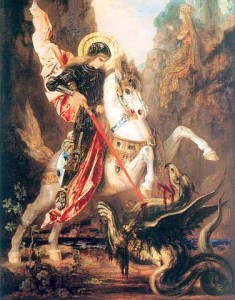 Today, as much of the world is eager to tell you, is William Shakespeare’s 445th birthday. The Bard of Avon, the Sultan of Stagecraft, the Titan of Tragedy, the Crown Prince of Comedy was born beneath a twinkling star on this day, April 23, in the Year of Our Lord 1564, whereupon he was wrapped in swaddling clothes and laid in a manger, and …
Today, as much of the world is eager to tell you, is William Shakespeare’s 445th birthday. The Bard of Avon, the Sultan of Stagecraft, the Titan of Tragedy, the Crown Prince of Comedy was born beneath a twinkling star on this day, April 23, in the Year of Our Lord 1564, whereupon he was wrapped in swaddling clothes and laid in a manger, and …
Oh, wait. Wrong myth.
It’s popular these days, as it has been for centuries in certain circles, to declare that the penny-pinching commoner WS couldn’t possibly have written all that stuff ascribed to him, and that the real genius behind the greatest achievements in the English language was Kit Marlowe, or Francis Bacon, or Edward de Vere, or a committee of sophisticates united in an elaborate literary conspiracy, or possibly Saint George, in an expansive mood after he’d polished off that pesky dragon.
Now Art Scatter discovers that not only did Shakespeare maybe not write Shakespeare, but maybe he wasn’t even born on the day we’ve all assumed he was. See this, from Anthony Holden, author of William Shakespeare: The Man Behind the Genius:
So another myth must be dispelled at the outset. There is no evidence, alas, to support the popular belief that William Shakespeare was born – as fifty-two years later he was to die – on 23 April, the date celebrated in England since 1222 as the feast day of dragon-slaying St George. As the poet’s posthumous fame grew, securing a unique niche for his country in the cultural history of the world, it was a natural enough temptation for posterity to unite the birthday of England’s national poet with that of its patron saint. But the tradition is based on a false assumption, that Elizabethan baptisms invariably took place three days after the birth.
The instruction given to parents in the 1559 Prayer Book, published five years before Shakespeare’s birth, was to have the christening performed before the first Sunday or holy day following the birth ‘unless upon a great and reasonable cause declared to the curate and by him approved’. In 1564 the 23rd day of April happened to fall on a Sunday, four days after the feast day of St Alphege and two before that of St Mark – traditionally an unlucky day, so the curate’s permission to avoid it may well have been forthcoming. But the contemporary inscription on Shakespeare’s tomb in Holy Trinity – that same church where he was christened on 26 April by the vicar of the parish, John Bretchgirdle – reads that he died in his fifty-third year (‘obiit anno . . . aetatis 53‘). We know that he died on St George’s Day, 23 April, so this would seem to imply that he was born before it, however marginally. There are few more satisfactory resolutions of this problem than that of the poet Thomas de Quincey, who suggested that Shakespeare’s granddaughter Elizabeth Hall married on 22 April 1626 ‘in honour of her famous relation’ – choosing the sixty-second anniversary of his birth, in other words, rather than the tenth of his death.
See — it was Saint George!
 All right, so I’m jumping to conclusions based on the thinnest of evidence. Which is pretty much, we here at Art Scatter tend to believe, exactly what the anti-Stratfordians have been doing all these years. The most rational response to this whole dust-up, we tend to believe, is that the guy whose name is on the cover actually wrote the stuff inside. But we also tend to think that, unless you own stock in downtown Stratford-Upon-Avon, which has a huge vested interest in the local boy actually being who he said he was, it doesn’t make a lot of difference. The play’s the thing. And the plays aren’t going away. (As a side note, Art Scatter would like to declare that we approve mightily of the historical existence of a character named Vicar Bretchgirdle. Did the good vicar know Sir Toby Belch?)
All right, so I’m jumping to conclusions based on the thinnest of evidence. Which is pretty much, we here at Art Scatter tend to believe, exactly what the anti-Stratfordians have been doing all these years. The most rational response to this whole dust-up, we tend to believe, is that the guy whose name is on the cover actually wrote the stuff inside. But we also tend to think that, unless you own stock in downtown Stratford-Upon-Avon, which has a huge vested interest in the local boy actually being who he said he was, it doesn’t make a lot of difference. The play’s the thing. And the plays aren’t going away. (As a side note, Art Scatter would like to declare that we approve mightily of the historical existence of a character named Vicar Bretchgirdle. Did the good vicar know Sir Toby Belch?)
It’s good to point out that although Holden doubts April 23 is Shakespeare’s birthday, he doesn’t doubt that Shakespeare wrote the plays and poems. And it’s good to note that inventing birthdays is a time-honored tradition. Jesus was almost certainly born sometime in spring, not on December 25, a date adopted to co-opt all those pagan solstice celebrations. And the great jazz trumpeter Louis Armstrong didn’t really know when he was born, so he settled on July 4, 1900, because … well, because in America, July 4 is a pretty special day.
So never mind all the kerfuffle, Bill. Here at Art Scatter we still believe in you. As Rosemary Clooney used to sing, a very merry unbirthday to you!